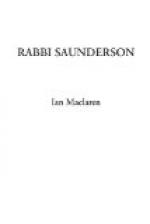“With all her excellences, there was also in her what I have noticed in most women, a certain flavour of guile, and on one occasion, when I was making a brief journey through Holland and France in search of comely editions of the fathers, she had the books carried out to the garden and dusted. It was the space of two years before I regained mastery of my library again, and unto this day I cannot lay my hands on the service-book of King Henry VIII., which I had in the second edition, to say nothing of an original edition of Rutherford’s Lex Rex.
“It does not become me, however, to reflect on the efforts of that worthy matron, for she was by nature a good woman, and if any one could be saved by good works, her place is assured. I was with her before she died, and her last words to me were, ’Tell Jean tae dust yir bukes aince in the sax months, and for ony sake keep ae chair for sittin’ on.’ It was not perhaps quite the testimony one would have desired in the circumstances, but yet, Mr. Carmichael, I have often thought that there was a spirit of . . . of unselfishness, in fact, that showed the working of grace.” Later in the same evening Mr. Saunderson’s mind returned to his friend’s spiritual state, for he entered into a long argument to show that while Mary was more spiritual, Martha must also have been within the Divine Election.
KILBOGIE MANSE
Ministers there were in the great strath so orderly that they kept their sealing-wax in one drawer and their string in another, while their sermons were arranged under the books of the Bible, and tied with green silk. Dr. Dowbiggin, though a dull man and of a heavy carriage, could find in an instant the original draft of a motion on instrumental music he made in the Presbytery of Muirtown in the year ’59, and could also give the exact page in the blue-books for every word he had uttered in the famous case when he showed that the use of an harmonium to train MacWheep’s choir was a return to the bondage of Old Testament worship. His collection of pamphlets was supposed to be unique, and was a terror to controversialists, no man knowing when a rash utterance on the bottomless mystery of “spiritual independence” might not be produced from the Doctor’s coat-tail pocket. He retired to rest at 10.15, and rose at six, settling the subject of his next sermon on Sabbath evening, and finishing the first head before breakfast on Monday morning. He had three hats—one for funerals, one for marriages, one for ordinary occasions—and has returned from the Presbytery door to brush his coat. Morning prayers in Dr. Dowbiggin’s house were at 8.5, and the wrath of the Doctor was so dangerous that one probationer staying at the manse, and not quite independent of influence, did not venture to undress, but snatched a fearful doze sitting upright on a cane-bottomed chair, lest he should not be in at the psalm. Young ministers of untidy habits regarded Dr. Dowbiggin’s study with despair, and did not recover their spirits till they were out of Muirtown. Once only did this eminent man visit the manse of Kilbogie, and in favourable moments after dinner he would give his choicer experiences.




